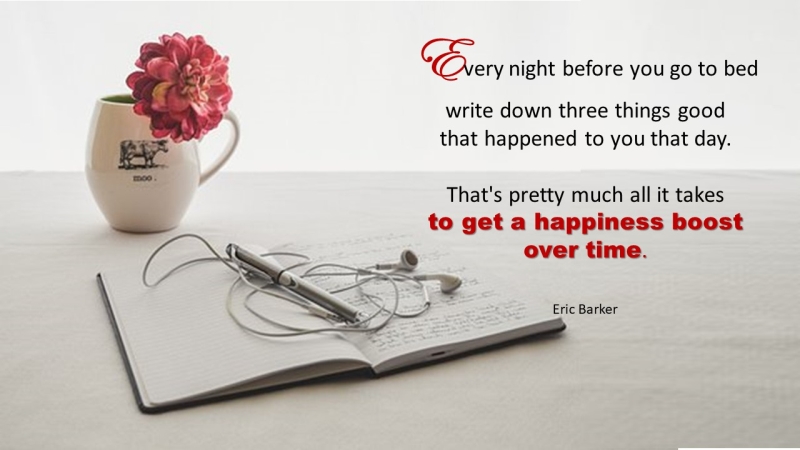SPENDING JUST A FEW MINUTES EACH NIGHT THINKING ABOUT THE GOOD THINGS that happened can make a big difference in your happiness. Let’s dive into why this practice works and how you can get started.
Why Gratitude Journaling Works
Gratitude journaling is a way to notice and appreciate the good things in your life. It can help you shift your attention away from the bad stuff and give you a better outlook on life. Listed below are just a few advantages of gratitude journaling for you:
- Reduces stress and anxiety: By focusing on positive experiences, you may feel less stressed and anxious overall. Research has shown that gratitude journaling can be an effective tool for managing symptoms of anxiety and depression.
- Improves sleep: Good night’s sleep is crucial for your overall well-being, and gratitude journaling can help. Studies have found that spending just 15 minutes each night writing down what you’re grateful for can improve the quality and duration of your sleep.
- Increases happiness: It’s not surprising that focusing on the positive can make you feel happier, but the effects of gratitude journaling can be long-lasting. Regularly practicing gratitude may make you more optimistic, content, and fulfilled.
The Benefits of Gratitude Journaling
Gratitude Journaling and Mindfulness
Keeping a gratitude journal is a way to be fully present and involved in the present moment. By reflecting on the positive moments of your day, you’re training your brain to focus on the good rather than getting caught up in negative thoughts or worries about the future. This could help you enjoy life more in the here and now.
Gratitude Journaling and Resilience
Gratitude exercises can strengthen the mind and body, allowing people to deal better with adversity. When you focus on the positive moments of your day, you may be better able to cope with stress and setbacks. By practicing gratitude, you can build a base of optimism and hope to help you through tricky times.
Gratitude Journaling and Relationships
Gratitude journaling can also benefit your relationships with others. By reflecting on the positive moments of your day, you may feel more connected to the people around you. You may also be more likely to show gratitude and appreciation to others, strengthening your relationships and making you feel more socially supported overall.
Gratitude Journaling and Creativity
Finally, gratitude journaling can also help boost creativity. When you’re in a positive state of mind, you may be more open to new ideas and inspiration. By regularly reflecting on the good things in your life, you may be more likely to notice beauty and wonder in the world around you, which can inspire new ideas and creative projects.
How to Get Started with Gratitude Journaling
So, how can you get started with gratitude journaling? It’s quite simple. Here’s a step-by-step guide:
Step 1: Set Aside Time Each Night
Make gratitude journaling a part of your nightly routine. Before bed, set aside a few minutes to reflect on your day and write down three things you’re grateful for.
Step 2: Choose a Journal
You don’t need anything fancy to get started with gratitude journaling. Choose something you’ll enjoy writing that is easy to access each night. You can use a simple notebook or a dedicated journal.
Step 3: Write Down Three Things You’re Grateful For
Every evening, list three things for which you are thankful. These could be anything, big or small, that brought you joy or made you feel thankful. Here are a few examples:
- “I’m grateful for the sunny weather today.”
- “I’m grateful for having dinner with my family tonight.”
- “I’m grateful for my friend’s kind words today.”
Step 4: Reflect on Your Day
As you write down your three things, reflect on your day briefly. Consider the joyous moments, no matter how small, and acknowledge the good things that happened.
Step 5: Keep it Up
Gratitude journaling is most effective when it’s done regularly. Make it a habit to write down three things each night, even when feeling down or when nothing particularly positive happens. You might be surprised at how much you must be grateful for, even on difficult days.
Tips for Success
Here are some more tips to help you get the most out of your gratitude journaling:
- Be specific: Be detailed when writing down what you’re grateful for. Instead of just writing, “I’m grateful for my family,” write, “I’m grateful for the funny conversation I had with my sister over dinner tonight.”
- Mix it up: While it’s important to acknowledge the big things you’re grateful for, don’t overlook the small moments of joy. Mix up your gratitude list each night to include a variety of experiences.
- Make it a habit: It’s important to make gratitude journaling a consistent part of your routine. To help you develop the habit, add it to your bedtime routine or set a reminder on your phone.
- Be authentic: Your gratitude list should reflect your genuine gratitude. Don’t feel pressured to include things you think you should be grateful for but don’t bring you joy.
- Try different approaches: If writing down three things each night isn’t resonating with you, try a different approach. You could write a more extended reflection on one thing you’re particularly grateful for or draw or make a collage of the positive moments from your day.
Final Thoughts
Writing in a gratitude journal is a simple but powerful way to improve your health and happiness. By taking a few minutes each night to think about the good things that happened that day, you can develop a sense of gratitude and positivity that will help you all your life. You may better manage stress, feel happier, and sleep more soundly. So why not give it a try? Grab a journal, reflect on the good things in your life tonight, and see where the practice takes you!




One Comment
Comments are closed.